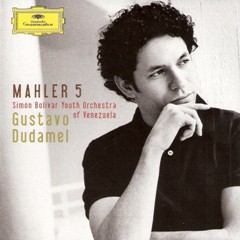111 Years of Deutsche Grammophon - CD 11
111 Years of Deutsche Grammophon - CD 11
Mahler: Symphony No.5

Symphony No.5 in C sharp minor 1 1. Trauermarsch (In gemessenem Schritt. Streng. Wie ein Kondukt - Plötzlich schneller. Leidenschaftlich. Wild - Tempo I) [12:42] 2 2. Stürmisch bewegt. Mit größter Vehemenz - Bedeutend langsamer - Tempo I subito [14:27] 3 3. Scherzo (Kräftig, nicht zu schnell) [17:21] 4 4. Adagietto (Sehr langsam) [10:46] 5 5. Rondo-Finale (Allegro) [14:09] Simón Bolívar Youth Orchestra of Venezuela Gustavo Dudamel – conductor
The Symphony No. 5 in C sharp minor by Gustav Mahler was composed in 1901 and 1902, mostly during the summer months at Mahler's cottage at Maiernigg. Among its most distinctive features are the funereal trumpet solo that opens the work and the frequently performed Adagietto.
The musical canvas and emotional scope of the work, which lasts over an hour, are huge. After its premiere, Mahler is reported to have said, “Nobody understood it. I wish I could conduct the first performance fifty years after my death.”[cite this quote] Conductor Herbert von Karajan said that when one hears Mahler's Fifth, “you forget that time has passed. A great performance of the Fifth is a transforming experience. The fantastic finale almost forces you to hold your breath.”
The symphony is sometimes described as being in the key of C♯ minor since the first movement is in this key (the finale, however, is in D). Mahler objected to the label: "From the order of the movements (where the usual first movement now comes second) it is difficult to speak of a key for the 'whole Symphony', and to avoid misunderstandings the key should best be omitted."
The piece is generally regarded as Mahler's most conventional symphony up to that point, but from such an unconventional composer it still had many peculiarities. It almost has a four movement structure, as the first two can easily be viewed as essentially a whole. The symphony also ends with a Rondo, in the classical style. Some peculiarities are the funeral march that opens the piece (starting with a rhythmic figure that unmistakably references the opening notes of Beethoven's 5th symphony), and the Adagietto for harp and strings that interrupts the booming score.








